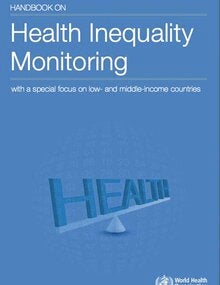Handbook on Health Inequality Monitoring with a special focus on low- and middle-income countries

|
The evidence generated from monitoring contributes to better-informed policies, programmes and practices, providing the necessary feedback to determine whether actions in the health sector and beyond are successful in reducing inequalities. In an effort to meet the demand for evidence-based results and accountability the World Health Organization, together with seven other agencies working in public health, have issued a call for action to strengthen the capacity for analysis, synthesis, validation and use of health data in countries.1 This includes ensuring that comparable estimates for common health indicators are made using the best available data and the most suitable methods, recognizing the need for coordination across settings. The Handbook on health inequality monitoring: with a special focus on low- and middle-income countries is a resource that enables countries to do just that. It presents a comprehensive yet clear overview of health inequality monitoring in a user-friendly manner. The handbook succeeds in giving those involved in health inequality monitoring an appreciation of the complexities of the process, as well as building the practical knowledge and skills for systematic monitoring of health inequalities in low- and middle-income countries. The use of the handbook will enable countries to better monitor and evaluate their progress and performance with a high degree of accountability and transparency, and allow them to use the results to formulate evidenced-based policies, programmes and practices to tackle inequalities in an effective manner. |
